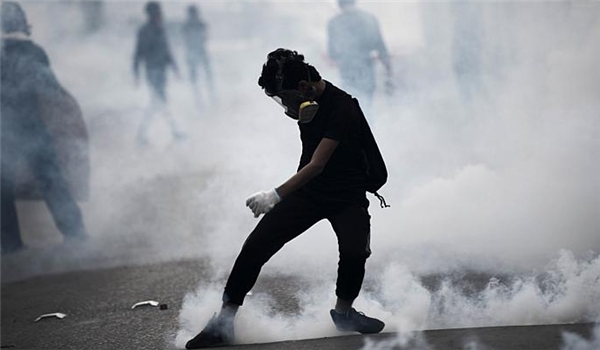
RNA - Bahraini troops used teargas to suppress a demonstration which was held in the village of Diraz by mostly female protesters on Monday, Al-Waght reported.
Bahraini scholars also railed against the ruling which they describe as legally and ethically unjust.
Bahrain's top military court sentenced six individuals to death on Monday after convicting them over charges including plotting to assassinate the Persian Gulf state's armed forces chief.
The court also sentenced seven other people linked to the case to seven-year jail terms and deprived them too of their citizenship, while five men were acquitted.
Ten of the alleged defendants appeared in the court, while, authorities claimed, eight are at large in Bahrain or abroad, while it was not clear which of the absent eight were sentenced to death and which to jail.
It was the first official mention of any plot against the life of Field Marshal Sheikh Khalifa bin Ahmed Al-Khalifa, who is a member of the ruling family, but the Bahrain News Agency gave no further details of when or where it was alleged to have taken place.
"The defendants were accused with the formation of a terrorist cell, attempting to assassinate the Bahrain Defence Force (BDF) Commander-in-Chief and committing other terrorist crimes," a statement read.
Al-Wefaq National Islamic Society described recent death sentences against six anti-regime activists as “null and void”.
"The sentences are null and void,” al-Wefaq said in a statement on Monday, stressing that they were based on false accusations and forced confessions.
Al-Wefaq further called on the international community to “bear its historical responsibility and save the Bahraini majority which has been oppressed” by the ruling regime.
Bahraini human rights organizations, including Bahrain Center for Human Rights (BCHR), Bahrain Forum for Human Rights, Persian Gulf Institute for Democracy and Human Rights (GIDHR), SALAM for Democracy and Human Rights, had issued a report under the title of "Death or Confession", a report that monitors the violations due to secret military courts that tried civilians whose confessions were extracted under torture.
Al-Wefaq had called on the Manama regime to halt the military trial of a group of civilians, slamming the military trial as a violation of both domestic and international laws.
The case is the first of its kind since Manama altered the country's constitution, granting military courts the right to try civilians, after Bahrain in March approved the trial of civilians at military tribunals in a measure blasted by human rights campaigners as being tantamount to imposition of an undeclared martial law countrywide.
Thousands of anti-regime protesters have held demonstrations in Bahrain on an almost daily basis ever since a popular uprising began in the country in mid-February 2011.
They are demanding that the Al-Khalifah dynasty relinquish power and allow a just system representing all Bahrainis to be established.
Manama has gone to great lengths to clamp down on any sign of dissent. In mid-March 2011, troops from Saudi Arabia and the United Arab Emirates were deployed to assist Bahrain in its crackdown.
Scores of people have lost their lives and hundreds of others sustained injuries or got arrested as a result of the Al-Khalifah regime’s crackdown.
847/940